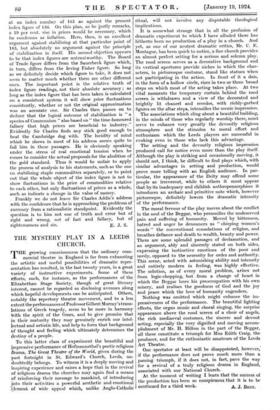THE MYSTERY PLAY IN A LEEDS CHURCH.
THE growing consciousness that the ordinary com- mercial theatre in England is far from exhausting the artistic and useful possibilities of dramatic repre- sentation has resulted, in the last twenty years, in a great Variety of instructive experiments. Some of these tffortsi such, for instance, as the performances of the Elizabethan Stage Society, though of great literary interest, cannot be regarded as disclosing avenues along which hopeful developments can be anticipated. Others, notably the repertory theatre movement, and to a less extent the performances of Professor Gilbert Murray's trans- lations of Greek tragedy, seem to be more in harmony with the spirit of the fimes, and to give promise that in their maturity they may genuinely enrich our intel- lectual and artistic life, and help to form that background of thought and feeling which ultimately determines the destiny of a people.
To this latter class of experiment the beautiful and impressive performance of Hofmannsthal's poetic religious &lama, The Great Theatre of the World, given during the past fortnight in St. Edward's Church, Leeds, un- doubtedly belongs. To witness it is a deeply moving and inspiring experience and raises a hope that in the revival of religious drama the churches may again find a means of reinforcing their message to mankind, of introducing into their activities a powerful aesthetic and emotional :element of wide appeal which, unlike Anglo-Catholic . .
ritual, will not involve any disputable theological implications.
It is somewhat strange that in all the profusion of dramatic experiment to which I have alluded there has hitherto been no production of a play in a church. And yet, as one of our acutest dramatic critics, Mr. C. E. Montague, has been quick to notice, a fine church provides an almost perfect setting for a serious and solemn play. The rood screen serves as a decorative background and its vertical apertures provide niches in which the char- acters, in picturesque costume, stand like statues when not participating in the action. In front of it a dais, in the form of a hollow circle, rises in two or three 'broad steps on which most of the acting takes place. At two vital moments the temporary curtain behind the rood screen is withdrawn and a view of the decorated and brightly lit chancel and reredos, with richly-garbed figures on the altar steps, intensifies the scenic impression.
The associations which cling about a beautiful building, in the minds of those who regularly worship there, must serve to enhance very greatly the devoutly religious atmosphere and the stimulus to moral effort and enthusiasm which the Leeds players are successful in evoking even in those who lack this advantage.
The setting and the devoutly religious impression produced call for notice even more than the play itself. Although the play is striking and occasionally moving, it should not, I think, be difficult to find plays which, with similar advantages in setting and production, would prove more telling with an English audience. In par- ticular, the appearance of the Deity may offend some people as irreverent, while to others it must appear that by its inadequacy and childish anthroponiorphism it introduces an archaic and primitive note which, howeVer picturesque, definitely lowers the dramatic intensity of the performance.
The moral fervour of the play moves about the conflict in the soul of the Beggar, who personifies the undeserved pain and suffering of humanity. Moved by bitterness, hatred and anger he denounces as " chirping women's words " the conventional consolations of religion, and breathes defiance and death to wealth, beauty and power. There are some splendid passages of declamation, and an argument, ably and sincerely stated on both sides, expressing the instinctive emotions of the poor and needy, opposed to the necessity for order and authority. This scene, acted with astonishing ability and intensity and entirely modern in feeling, was highly effective. The solution, as of every moral problem, arises not from logic-chopping, but from a change of heart in which the Beggar loses his preoccupation with his own misery, and realises the goodness of God and the joy and peace which the love of humanity engenders.
Nothing was omitted which might enhance the im- pressiveness of the performance. The beautiful lighting effects, the organ music and choral singing, the surprise appearance above the rood screen of a choir of angels, the rich mediaeval costumes, the sincere and devout acting, especially the very dignified and moving accom- plishment of Mr. H. Hilton in the part of the Beggar, all these constitute a triumph for Miss Edith Craig, the producer, and for the enthusiastic amateurs of the Leeds Art Theatre.
One spectator at least will be disappointed, however, if the performance does not prove much more than a passing triumph, if it does not, in fact, pave the way for a revival of a truly religious drama in England, associated with our National Church.
At the moment of writing I learn that the success of the production has been so conspicuous that it is to be continued for a third week. A. J. BEST.










































 Previous page
Previous page